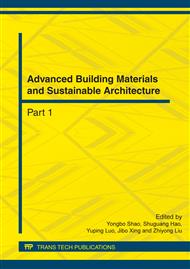p.2119
p.2122
p.2126
p.2133
p.2137
p.2142
p.2147
p.2151
p.2155
Estimation of Wall Friction of Chamber Box Using Consolidation Characteristic
Abstract:
An estimation of wall friction during the consolidation of kaolin in testing chamber using the consolidation characteristic is presented herein. A slurry of kaolin was consolidated one dimensionally in a testing chamber under Overconsolidation Ratio (OCR) of ten. The moisture content and undrained shear strength were determined after the consolidation completed. It was found that, the moisture content decreases and the undrained shear strength increases with chamber depth. The differences were observed in the moisture content and strength measurements with increasing depth due to the influence of wall friction during the consolidation process. By using consolidation characteristic of kaolin from the testing chamber and Rowe cell (supplementary test), estimation of wall friction was calculated. It was found that, the wall friction estimation provided differences less than 2.2% with the experimental test.
Info:
Periodical:
Pages:
2137-2141
Citation:
Online since:
May 2012
Authors:
Keywords:
Price:
Сopyright:
© 2012 Trans Tech Publications Ltd. All Rights Reserved
Share:
Citation:


